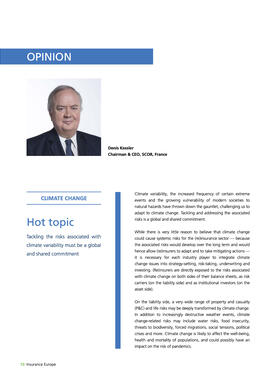- FR
- EN
Tackling the risks associated with climate variability
Denis Kessler, Chairman & CEO of SCOR, discusses the fight against climate change in Insurance Europe’s Annual Report
June 14, 2019

Climate variability, the increased frequency of certain extreme events and the growing vulnerability of modern societies to natural hazards have thrown down the gauntlet, challenging us to adapt to climate change. Tackling and addressing the associated risks is a global and shared commitment.
While there is very little reason to believe that climate change could cause systemic risks for the (re)insurance sector – because the associated risks would develop over the long term and would hence allow (re)insurers to adapt and take mitigating actions – it is necessary for each industry player to integrate climate change issues into strategy setting, risk taking, underwriting and investing. (Re)insurers are directly exposed to the risks associated with climate change on both sides of their balance sheets, as risk carriers (on the liability side) and as institutional investors (on the asset side). As regards the liability side, a very wide range of P&C and Life risks may be deeply transformed by climate change. In addition to increasingly destructive weather events, climate change-related risks may include water risks, food insecurity, threats to biodiversity, forced migrations, social tensions, political crises, and so on. Climate change is likely to affect the well-being, health and mortality of populations and could possibly have an impact on the risk of pandemics. As regards the asset side, (re)insurers must face the implications of climate change on their investments, considering both physical and transition risks.
Let us look at the asset side first.
From an economic standpoint, a fundamental step when considering the fight against climate change is to examine the normative issue of the compatibility of financial asset prices with the so-called “common good”, and to analyze the conditions necessary to ensure that capital allocation on a macroeconomic level maximizes collective wellbeing. For instance, if renewable energy projects could be financed at a lower interest rate than those linked to fossil fuels, the energy transition would be the natural outcome of rational investment decisions by economic agents and therefore much easier to accomplish. This kind of analysis requires a look at the determination of the discount rate used to quantify the economic impact of climate change and value the measures and projects designed to mitigate the associated risks. This discount rate is the crucial parameter used to measure the “sacrifices” made by current generations, and to assess the relevance and legitimacy of those sacrifices in light of the estimated wealth of future generations1. It is crucial to address latent market short-termism to efficiently fight climate change on the asset side.
Absent such an “ethical” valuation – which aligns asset prices with what they should be according to our societal goals – any “common good” problem such as the fight against climate change gives rise to moral hazard and free-rider issues. While all economic agents are likely to gain significant benefits in the long term from a reduction in greenhouse gas emissions, few of them want to take action individually and incur their fair share of the costs. Instead, they would rather let their peers shoulder the burden of the environmental transition. In such a situation, an integrated solution to the issue of climate change thus requires us to find ways to combat free-riding behavior. That can be done through well designed economic policies incorporating incentive systems that align the individual interests of the various economic agents with the collective interest2. This would help to ensure that businesses include the social cost of the environmental externalities they cause in their production process and would thereby encourage them to implement sustainable development policies and strategies. In this way, negative externalities driving climate change would be “internalized” in the decisions made by all economic agents. Hence it is critically important to articulate the role that the private sector should assume in combating climate change, and the associated technology, regulatory and competition-related issues.
Let us look now at the liability side.
A study published in early 2019 by the CRO Forum highlighted the fact that, due to the risks associated with global warming, maintaining insurability throughout the world may be challenging. The (re)insurance sector has a pivotal role to play in facilitating comprehension, mitigation and protection with regard to the risks arising from climate change, for two main reasons: its deep expertise in risk modeling and the structuring of risk transfer solutions, and its fundamental function of pooling risks to optimize diversification benefits. Protecting the welfare of citizens and communities is an integral part of the (re)insurance industry’s corporate mission. We need in particular to promote insurability and to bridge the so-called "protection gap", because there are still too many people who remain underinsured, in both emerging and developed countries. Addressing this global issue requires the combined efforts of governments and the private (re)insurance industry, in the form of strong and innovative public-private partnerships.
The industry has been progressively committed to fighting climate change for a very long time. The SCOR group was one of the first to grasp the importance of managing extreme events and the risks associated with climate change, by signing the UN Global Compact in 2003. The (re)insurance industry further supported the Kyoto Declaration in May 2009, under the aegis of the Geneva Association. Ahead of several international declarations, the Geneva Association clearly stated ten years ago that climate change poses a major long-term threat to the global economy. It also stressed that the fight against the consequences of climate change needs to be a global commitment requiring the combined efforts of all (re)insurers, as their fiduciary responsibility. The “Extreme Events & Climate Risk” working group of the Geneva Association specifically investigates the issues pertaining to climate change. More recently, in 2016, the Insurance Development Forum was set up by the industry, the United Nations and the World Bank to foster modeling and increase (re)insurance penetration. Furthermore, the (re)insurance industry is closely following and actively supporting scientific research to roll back the frontiers of knowledge and share insights into the main climate change-related risks threatening the world.
In an ever riskier and more uncertain world, the (re)insurance industry has a leading role to play in working towards sustainable and responsible development. It is our collective responsibility to prepare for the industry’s future, and more fundamentally to undertake everything possible to enhance the well-being of future generations.
1 See Christian Gollier, Ethical asset valuation and the good society, Columbia University Press, 2017
2 See Jean Tirole, Economics for the Common Good, Princeton University Press, 2019

